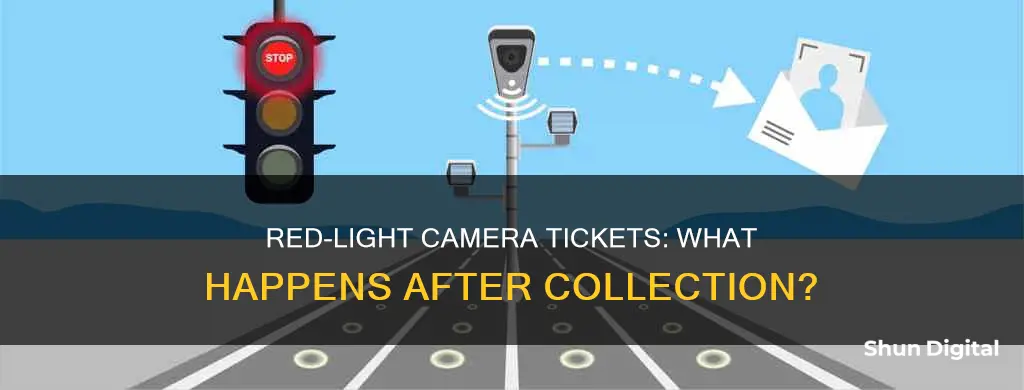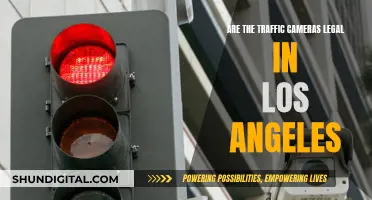
Red-light camera tickets are issued to help reduce the number of vehicles that proceed through intersections after the signal has turned red. The penalty for these tickets is a standard fine, which varies depending on the location. For example, in Ontario, the fine is $325, whereas in California, it is $300.
If you receive a red-light camera ticket, you will typically have 15 days to respond, either by paying the ticket or disputing it. If you do not respond within this time frame, you will be found guilty of the offence by default.
Failing to pay the fine associated with a red-light camera ticket can result in your inability to renew your driver's licence or vehicle registration. The ticket may also be sent to collections by your local municipality, which could affect your credit rating.
| Characteristics | Values |
|---|---|
| Penalty | Standard fine of $260 + Victim Fine Surcharge of $65 (total $325) |
| Demerit points | None |
| Driving record | No impact |
| Insurance | No impact |
| Response time | 15 days from the "deemed date of service" |
| Failure to pay | Inability to renew license plate |
| Late payment | Additional administrative fee |
| Unpaid fines | Sent to collections by municipality and can affect credit rating |
What You'll Learn
- The ticket is sent to the registered owner of the vehicle, regardless of who was driving
- If you don't pay the ticket, you will be unable to renew your license plate
- If you are late paying the ticket, an administrative fee will be added to the fine amount
- Unpaid fines could be sent to collections and affect your credit rating
- The ticket will not appear on your driving record or impact your insurance

The ticket is sent to the registered owner of the vehicle, regardless of who was driving
In the case of a red-light camera ticket, the ticket is sent to the registered owner of the vehicle, regardless of who was driving. This is because red-light cameras are unable to identify the driver of the vehicle. The registered owner will typically have 15 days from the "deemed date of service" to respond to the ticket, either by paying it or disputing it.
If the ticket is not paid by the due date, which is usually 15 days after conviction, the following penalties could occur:
- The owner will be unable to renew their license plate until the ticket is paid.
- An administrative fee will be added to the fine amount.
- Unpaid fines could be sent to collections by the local municipality, which may affect the owner's credit rating.
Red-light camera tickets are limited to a monetary penalty with no insurance increase or demerit points.
Mastering Camera Raw Cache: Tips to Control Size
You may want to see also

If you don't pay the ticket, you will be unable to renew your license plate
If you don't pay a red light camera ticket, you will face several consequences, one of which is being unable to renew your license plate.
Red light cameras are installed at high-volume or high-accident-rate intersections to prevent drivers from running red lights and causing accidents. When a vehicle enters an intersection once the light has turned red, the camera will take a photo of the car and its license plate. An officer will review the photo to verify that the vehicle has run a red light. The ticket will then be mailed to the registered owner of the vehicle.
If you do not pay the ticket, you will not be able to renew your license plate or driver's license. You will have to pay the ticket before you can renew your license. In addition, an administrative fee will be added to the fine amount if you are late in paying the ticket. Unpaid fines could also be sent to collections by your local municipality and affect your credit rating.
The First Camera: Joseph Niépce's Invention
You may want to see also

If you are late paying the ticket, an administrative fee will be added to the fine amount
If you are late paying a red-light camera ticket, an administrative fee will be added to the fine amount. This is the case in Ontario, where the penalty for these tickets is a standard fine of $260 plus a Victim Fine Surcharge of $65 (totaling $325). In the City of Chicago, a late payment penalty will be assessed that is equal to the lesser of the original fine amount or $250 minus the original fine amount.
Mastering Camera Raw: Adjusting Clarity for Stunning Photos
You may want to see also

Unpaid fines could be sent to collections and affect your credit rating
Unpaid fines, such as red-light camera tickets, can be sent to collections and have a negative impact on your credit rating. This is because they are considered part of your payment history, which has a significant influence on your credit score. While a single fine may not affect your credit score, multiple fines can indicate a history of poor payment behaviour, which can be reflected in your credit history and score.
In the past, fines had a more significant impact on credit scores. However, regulatory changes made in February 2020 mean that writs and summons are no longer considered publicly available information and cannot be listed on credit reports. Despite this, it is important to note that unpaid fines can still have legal and financial implications. For example, in some states, the only penalty for failing to pay a red-light camera ticket is a black mark on a driver's credit score. Additionally, having multiple fines can result in insurers increasing the cost of your premiums to mitigate the higher risk you pose.
To avoid negative consequences, it is advisable to pay off collection accounts as soon as possible. While paying off a collection account may not immediately improve your credit score, as collection accounts remain on your credit report for seven years from the date your account became delinquent, the effect on your credit score will diminish over time until the account is removed from your credit report entirely.
It is worth noting that, in some cases, you may be able to set up a payment plan or negotiate a lower payment amount for unpaid fines, making it easier to resolve the issue and avoid further negative impacts on your credit rating.
Loading Batteries into Your DXG 552 Camera: A Step-by-Step Guide
You may want to see also

The ticket will not appear on your driving record or impact your insurance
Red light camera tickets are used by municipalities to help reduce the number of vehicles that proceed through intersections after the signal has turned red. While the penalty for these tickets is a standard fine, there are no demerit points involved and the ticket will not appear on your driving record or impact your insurance. This is because red light cameras have no way of identifying the driver of the vehicle. When these tickets are issued, they are sent to the registered owner of the vehicle, regardless of whether they were driving at the time of the incident or not.
If you receive a red light camera ticket, you will typically have 15 days from the "deemed date of service" to respond, either by paying the ticket or disputing it. If you plan to dispute the ticket, do not pay it. Instructions on how to proceed will be indicated on the ticket, either on the back of the paperwork or on a separate piece of paper.
If you do not respond to the ticket within 15 days, it will be deemed undisputed, and you will be found guilty of the offence by default. If the fine is not paid by the due date, which is usually 15 days after conviction, the following penalties could occur:
- You will be unable to renew your license plate until the ticket is paid.
- An administrative fee will be added to the fine amount.
- Unpaid fines could be sent to collections by your local municipality and could affect your credit rating.
However, it is important to note that the penalties for red light camera tickets are limited to monetary penalties, and there is no insurance increase or demerit points involved. As such, if you receive a red light camera ticket, you may not need the services of a lawyer to fight the ticket.
Understanding Aperture Mode: Creative Control Over Your Camera
You may want to see also
Frequently asked questions
If you are the driver and the registered owner of a vehicle that received a red light camera ticket, you may choose to ignore the citation; however, once the court date passes, the court with jurisdiction over your red light camera ticket will enter a failure to appear (FTA) for the ticket.
A red light camera ticket that remains in failure to appear or FTA status will eventually go to collections. It can take months, or even years, for a camera ticket to go to collections, and many times people forget they even received a ticket in the first place.
It can take as little as two weeks, or up to eight weeks, for you to receive your red light camera ticket in the mail. Typically, most offenders receive their ticket within four weeks.
Yes, most people dispute the ticket in order to reduce the fine amount. However, overturning these tickets rarely happens except during extenuating circumstances.







